|
Return to
Coalbrookdale
Thomas retired from the Metropolitan Railway in
1908, at the age of 65, and returned to Coalbrookdale, near to where
he was born.
In 1907 the family purchased Severn House, Buildwas Road,
Ironbridge, from the Maw family. The house still exists and is now
the Valley Hotel.
Thomas had always lived a busy life and in retirement he found
plenty of things to do. He retained his keen interest in
science, and equipped a laboratory and workshop in the house, so
that he could keep abreast of modern developments.
Because of his radical political views, he refused the
possibility of a knighthood. |
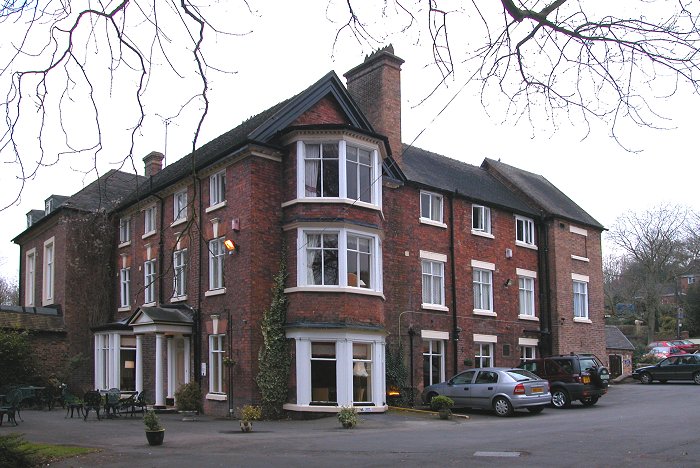
The Parker family's final home; Severn
House, now the Valley Hotel.

The family got together at
Severn House to celebrate Jane's 60th birthday, on 24th October,
1908. This was the last occasion on which all of the family met.
Back row L to R:
Kelvin, Walter, Jessie, Annie, Alfred, Charles, Thomas Hugh, Edwin
and Lilly.
Front Row seated:
Thomas and Jane. |
| When interviewed, Thomas gave his thoughts on how
young people should make their way in the world:
"Many young fellows are too diffident in making a beginning,
they think too much of what people may say if they fail. Tell
them no man has yet succeeded who has not many times failed.
Success rises out of failure. You must persevere, persevere, if
you are to succeed. The word persevere means 'playing the
game'.
Each generation has to be educated according to its
requirements. Capacity can be handed down from father to son,
but not knowledge.
Often success is achieved by the application of knowledge of the
simplest kind. Great engineers often have a vast amount of
knowledge, which is of no practical use to them. Tell your young
men, therefore, not to be discouraged. They must work hard of
course, be industrious and above all practical."
|
|
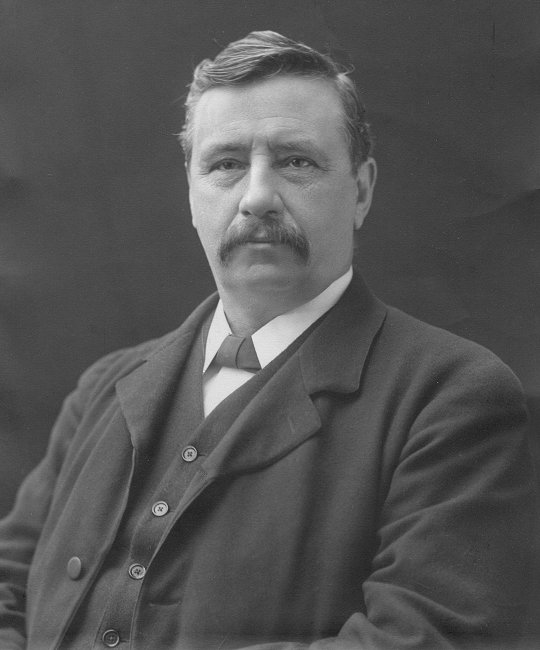 |
Thomas Parker. |
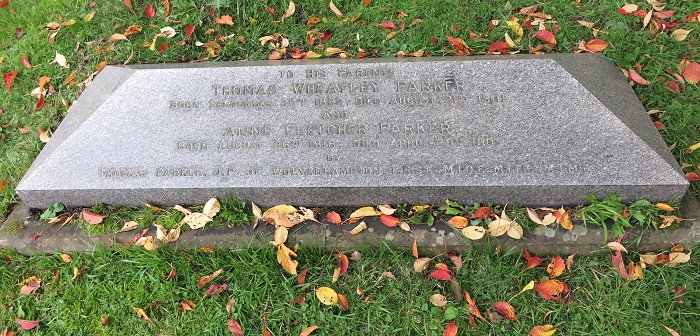
Thomas's mother and father are buried at Holy Trinity Church,
Coalbrookdale, and it's likely that they were parishioners. Thomas's father died in 1901 and his mother died four years
later. Their last home was at Dale cottages in Coalbrookdale. |
Thomas had the gravestone erected for them, which carries the following
inscription:

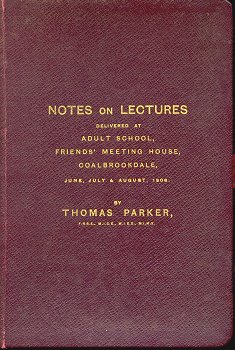
| The cover of
the booklet containing Thomas's lecture notes |
|
On his return to Coalbrookdale, Thomas began
to lecture again, something he hadn't done for 26 years,
since his days at the Coalbrookdale Institution. In June,
July and August, 1908 he gave a series of lectures at the
Adult School, Friends Meeting House, Coalbrookdale on
electricity, physics and chemistry. The lectures were
aimed at young people who had been educated at the Board
Schools and wanted to study technical sciences in the hope
of improving their career prospects in business and
engineering. A booklet was printed for the course, which
included sections with simple mathematics and formulas on
Newton's Laws of Motion, electricity, dynamos and motors,
heat, gases, steam, machinery, chemistry and pneumatics. |
|
Court Works Limited
Far from taking it easy in retirement, Thomas
remained active until the end of his life. In 1910 he purchased
the Court Works and ran it with his son Charles. The works were founded
in 1845 to 1846 by James Foster. He built three blast
furnaces near the newly opened mines on his Madeley Court
estate. The ironworks closed in 1902 and were taken over in
1910 by Thomas and Charles, who established Court Works
Limited, on the site. The works included a foundry, that specialised in castings for the electrical industry, and was
known locally as Parker’s. In 1916 the company employed
about 60 people.
|
|
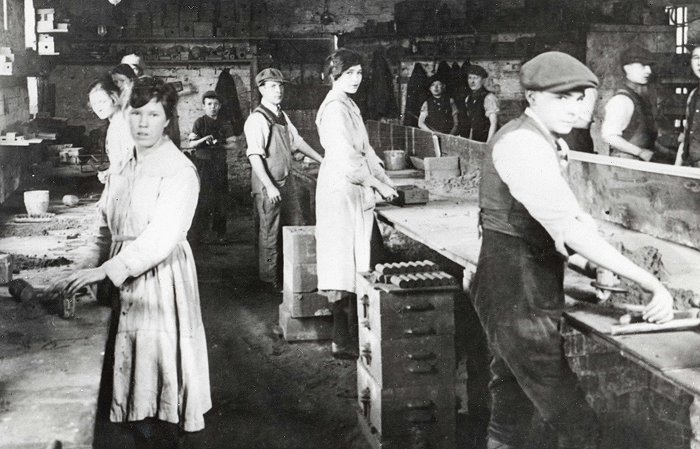
The casting benches at Court Works
in about 1915. Courtesy of Andy Rose. |
| Thomas was a skilled metallurgist, and at
the factory he intended to experiment with a more efficient
method of producing wrought iron. When Thomas died, his son
Charles took over, and during the first world war the works
produced munitions as part of the war effort. After the war,
most of the company's orders came from Sunbeam, for car
cylinder blocks. In about 1925 Charles sold the works to Rootes Bros., who were Sunbeam's London agents, for £20,000.
He then purchased Fordhams at Wolverhampton for two of his
sons; Clive and Jack. But that's another story. In the
mid 1960s, Court Works Limited specialised in castings for
overhead power lines. The products were sold directly to
contractors, both at home and abroad. The future looked
bright and so another annealing furnace was installed. The
firm developed a new form of malleable iron, which was first
used in engine cylinder heads. In the early 1970s, demand
for overhead power line castings fell, and the business
began to lose money. In 1972 it was sold to Newman
Industries of Bristol, and then became part of H. W. Lindop
& Sons of Walsall, a firm specialising in castings for
vehicle manufacturers.
Court Works Limited went into voluntary liquidation on
30th December, 1983, as can be seen from the notice below,
that appeared in the London Gazette.
Court Works site then became an industrial
estate, which is still called
Court Works industrial estate. There was a small foundry
on the site until 2003. |

In 1913 Thomas developed a perpetual sundial
which could be fitted to the outside of a building. He
called it his Solar Dial and Perpetual Calendar and it was
manufactured at Court Works. One was fitted above the main
entrance at Severn House, but sadly all traces of it have
now disappeared. |
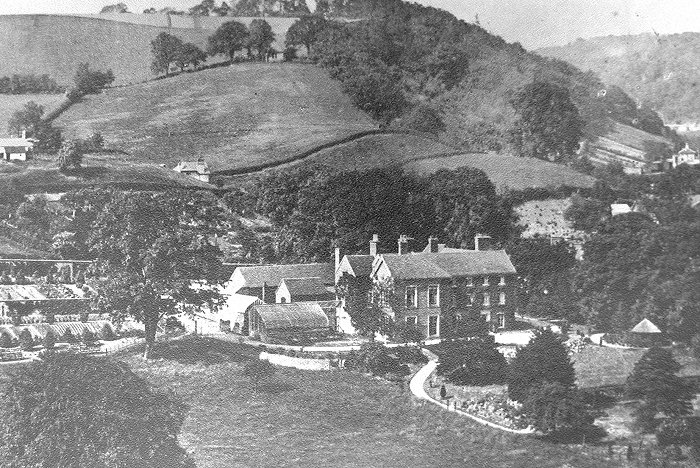
A view of Severn House from across
the valley. Courtesy of Gail Tudor. At Severn House there was a large garden,
which included a 32ft. x 16ft. vinery. It contained 19 vines
and Thomas experimented with the production of wine. Some bottles of the wine may still exist today. If
anyone comes across a bottle of 'chateau bottled' Severn
House wine, please let us know. |
|
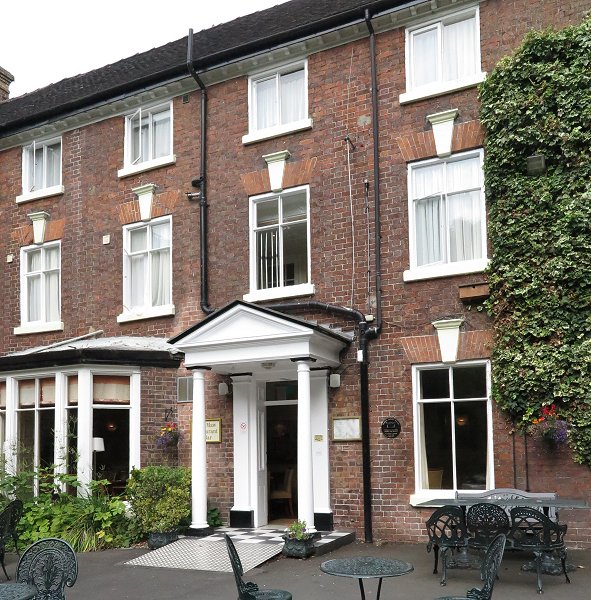
Another view of Severn House. |
| On his return to Coalbrookdale, Thomas maintained his links
with the Liberal Party. A garden party was held at Severn House
for the Liberal Woman’s Social Council on 29th August, 1912. It was reported in the Wellington Journal and Shrewsbury News
as follows: |
|
The Wellington Journal and Shrewsbury News. 31st
August, 1912.
Liberalism
Beautiful weather prevailed on
Thursday at a garden party held at Severn House (Kindly lent by
Mr. And Mrs. T. Parker) under the auspices of the Liberal
Woman’s Social Council (Shropshire Branch), of which Lady Acton
is president.
600 people attended and tea was
served in a large marquee, and followed by a public meeting on
the lawn. Lady Crewe presided and thanked Mr. And Mrs. Parker
for their kindness in placing the gardens at their disposal. A
number of speeches followed and Lady Roxburgh addressed the
meeting and expressed the hope that Mrs. Parker would soon
recover from her recent accident.
Mr. Thomas Parker said that he
was pleased to meet the company, and should like to see them
oftener. A great deal devolved upon them all; they should all do
their duties in national affairs, and should feel their own
individual responsibility. Everyone should have his fair share
of this life, and he (the speaker) was one who would help anyone
to get his rights. They should study the questions themselves,
and seek to know the truth of the matter. |
|
|
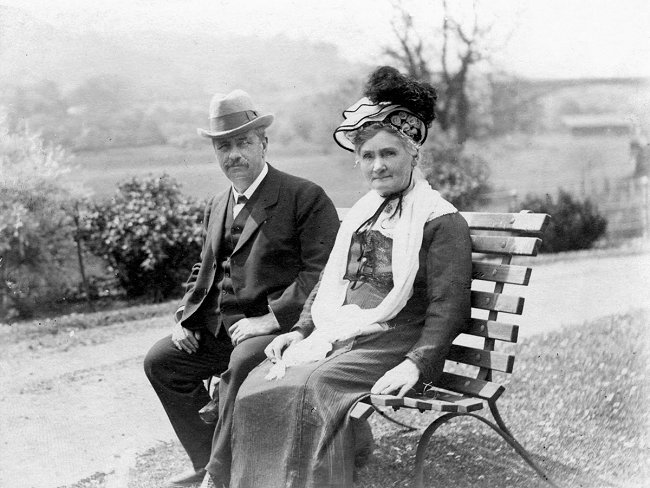
Thomas and Jane in their garden at
Severn House in about 1914. Courtesy of Gail Tudor. |
| Throughout his life, almost until the end,
Thomas was an energetic man. He was always developing or
inventing something. One of his last projects was a
motorboat, which he designed and built at the house. The
River Severn is notoriously shallow at Ironbridge and Thomas
thought that it would be a simple matter to produce a
powered boat that could be used in the gorge. The boat was
36ft. long and 6ft. 9inches wide with a draught of only nine
inches. It could be used wherever a rowing boat could go.
The garden at Severn House goes right down to the edge
of the river and so he sailed the boat from his garden. |

| A prayer from
Thomas's notebook. Courtesy of Gail Tudor. |
|
Thomas's last notebook still survives. It
contains some prayers, religious text, his thoughts on
railways and many notes and calculations on weights and
measures. The photograph opposite is from the first page,
which contains one of his prayers. It was written on 12th
December, 1914, a year before his death:
Oh Father I pray thee to inspire and direct me with the
truth, the spirit of the truth, love and thy common
Fatherhood. The Gospel of Christ. |
|
It seems likely that Thomas and Jane attended Holy Trinity
Church, Coalbrookdale, which is close to Severn House.
The church was built by Abraham Darby IV. The foundation stone was laid by Abraham's wife, on
11th December 1851 and the completed building was
consecrated by the Bishop of Hereford on 25th July 1854.
At the east end of the church is the grave of Abraham
Darby IV and his Wife Matilda. The grave was cleaned and
restored in 1993 and is a fitting memorial to the
Founder of the church.
The family bible was given to the church and
inside are a few of Thomas's handwritten notes, which
were transcribed by Jessie Eliza Hall-Christie, Thomas's
youngest daughter, on 3rd October, 1975.
|
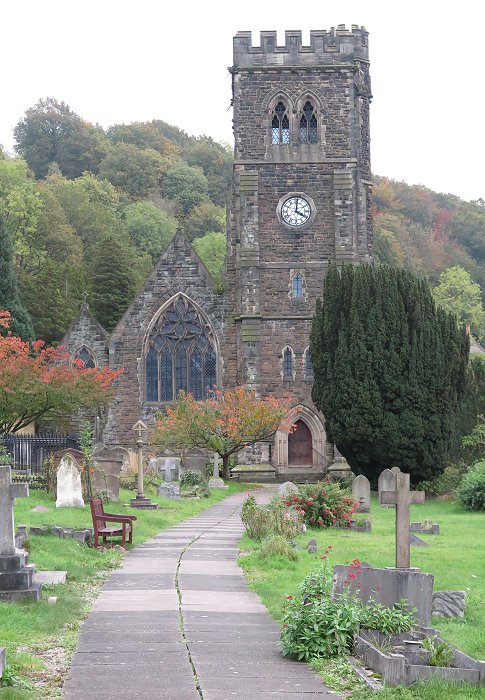
Holy Trinity Church, Coalbrookdale. |
| Thomas's notes in the bible are as follows: |
| Michael Fletcher - my mother's Father, held
a good position under the Coalbrookdale Co. for many years
to his death. He was buried at Madeley Church - in front -
1854 age 64.
This Bible was given to my mother on her marriage to
T.W. Parker by her Father Michael Fletcher.
Thomas Parker
Severn House
Ironbridge. 1912. |
Family of Thomas Wheatley Parker
and his wife Ann
| Thomas |
Born |
December 22 |
- |
1843 |
| Francis Ann |
do. |
February 5 |
- |
1846 |
| Michael John |
do. |
September 11 |
- |
1847 |
| Mary Ann |
do. |
December 29 |
- |
1849 |
| Walter George |
do. |
September 9 |
- |
1851 |
| Sarah Jane Eliza |
do. |
January 8 |
- |
1853 |
| Elizabeth Emily |
do. |
February 21 |
- |
1854 |
| Hannah |
do. |
February 17 |
- |
1857 |
Deaths
| Walter George |
|
November 21 |
- |
1851 |
| Francis Ann |
|
June 20 |
- |
1846 |
| Sarah Jane Eliza |
|
February 26 |
- |
1853 |
| Elizabeth Emily |
|
August 17 |
- |
1857 |
|
|
Thomas was deeply religious and during his last years
he compiled a little book of the sayings of Christ, with
parallel passages from the four Gospels. He published the book
at his own expense and gave hundreds of copies away to anyone
that he met. The book was called "The Gospel of the Kingdom" and
the original copy was given to the Shropshire County Library.
This was a tribute to his sincerity and the simplicity of his
own religious faith.
Thomas died on Sunday 5th December, 1915 after a long
illness. Charles Peskin, a contemporary amateur
historian, recorded in his diaries that Thomas died from a brain
tumour.
There were many obituaries, the Times newspaper of the 8th December included a
half-column obituary called "A Versatile Engineer Inventor". At
Wolverhampton Police Court, one of Thomas's fellow J.P.s, Mr.
Beckett, had this to say about Thomas, on the Tuesday following
his death:
As a magistrate it is my somewhat painful duty to
refer to the death of the late Mr. Thomas Parker, who was for
many years a magistrate sitting on this Bench. He and I were
honoured by being placed on the Commission of the Peace at the
same time, and for some years Mr. Parker very assiduously
attended to his duties as Justice of the Peace here until he
left the neighbourhood.
He was always very careful, very exact,
and if he had any inclinations at all they were more towards the
prisoner in the dock than towards the prosecutor. But a
fairer-minded man, as a magistrate, I think it was very rarely
our opportunity to meet with. I had known him for many years. He
was a somewhat unique character; a man who had risen from low
position, and who was never too proud to acknowledge the
position from which he came.
My colleagues and I, am sure everyone who
has been accustomed to sit in the Court, will agree that we should send our deep sympathy to
Mrs. Parker and family in their great loss.
| |
|
| Read an obituary
written by the Institute of Mechanical Engineers,
and one from The Engineer magazine |
 |
| |
|
Sarah Barker wrote a short poem as a tribute:
|
In Memoriam
Born amid famed hills and glinting vale,
Birthplace of thrilling fitness,
Mid triumphs of keen native skill,
As first iron bridge doth witness.
The stream it spans upon its breast,
The first iron-clad boat bore,
The venture too of thy great life,
Shall live for evermore.
While science yields electric thrills,
While engineering glory,
The world to mighty deeds shall press,
Thy name shall live in story.
The story of Salopia's pride,
In her dreams of fame world-wide. |
Thomas was buried in the Fletcher family's vault at
Madeley parish church.
Amongst the gold medals and diplomas, and other
trophies of his successful career that were kept in his study,
there was a violin. He treasured it because at the age of
fourteen, he had made it with his own hands and learned to play
it.
|
|
After Thomas's death, Jane and the children presented Holy
Trinity Church with this beautifully-made, ornate writing
desk. |
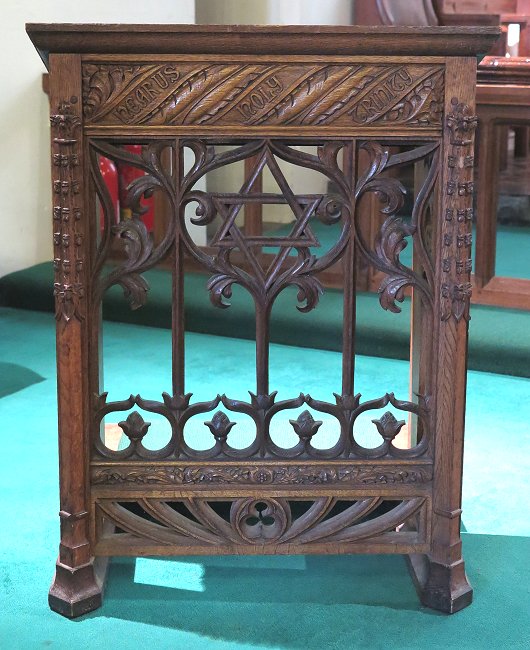 |

The writing desk carries the
following inscription:
To the glory of God and in loving memory of Thomas Parker
F.R.S.E., M.I.C.E., M.I.M.E., M.I.E.E., J.P. Born Coalbrookdale
22nd Dec. 1846. Died there 5th Dec. 1915. Given by his widow and
children.
Note:
Thomas's birth date is given as 1846, instead of
1843.
|
 |
The rear of the writing desk. |
| Thomas's Will
The will was drawn-up by Thomas's friend and solicitor, George Thorne of Wolverhampton. The trustees were
Jane Parker, daughters Annie and Jessie, and his friend John
Twigg Homer. All of his possessions in and around the house were
left to the trustees on the understanding that Jane could use
and enjoy them during her lifetime.
He left Court Works and his shares in the company to his sons
Charles, Walter and Kelvin. He left Severn House and its land to
the trustees on the understanding that it would be sold as soon
as possible, or certainly within two years of his death.
The
remaining money after death charges etc. had been paid, would be
invested in a trust fund for the benefit of his wife and
children. |
|
Jane Parker. Courtesy of Gail Tudor. |
 |
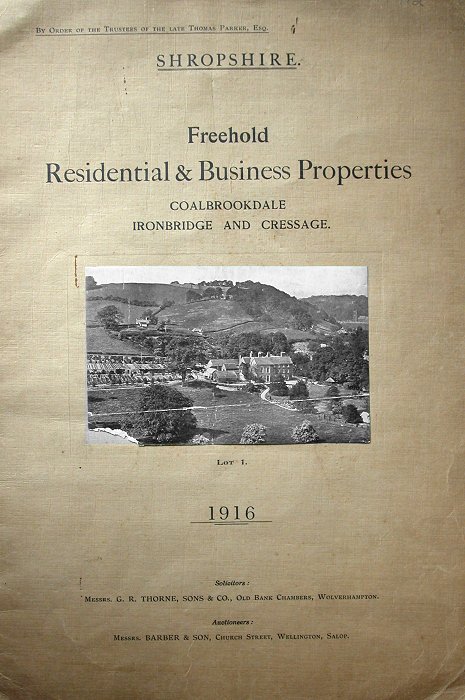 |
Severn House was sold by auction at the
Tontine Hotel, Ironbridge, on 27th June 1916. The estate
included two cottages, stables, cowsheds, vineyard, orchard,
a field of meadow land, croquet and tennis lawns.
The house had gas central heating, a telephone, a
dynamo and electric lighting.
The cover of the sale
catalogue for Severn House. Courtesy of the library and archives
of the Ironbridge Gorge Museum, at Coalbrookdale.
|
| Jane died on 24th August, 1921 and was buried in the
vault alongside her husband.
Jessie presented a memorial to Holy Trinity Church, which was
dedicated to her father and still hangs in the church today.
She
also presented the church with the cushions for the pews that
are still in use today.
Jessie's memorial to her
father.
|

|
|
The memorial is inscribed as follows:
|
IN MEMORY OF
THOMAS PARKER
J.P. M.I.E.E. M.I.C.E. M.I.M.E. F.R.S.C.
ENGINEER & SCIENTIST
Born in Coalbrookdale on 22nd December 1843, where his
father and several generations before him had been employed
by the great Coalbrookdale Iron Company. His early education
began at the Quakers School, Coalbrookdale and later at
Hulme Hall, Manchester where he studied science and
metallurgy. He was employed by the Coalbrookdale Company in
1862, and in 1882 at the age of 39 became Manager. During
this period be developed the dynamo.
HIS PIONEER WORK
|
1881 |
Responsible for the first electric tramway in the world
at Portrush, Northern Ireland. Powered by the first
hydro-electric generator. |
|
1882 |
Shared the invention of the Planté battery. |
|
1882 |
Founded the first company in the Midlands to manufacture
electrical equipment. |
|
1884 |
Designed electric powered transmission system for
collieries. |
|
1884/5/6 |
Designed equipment for refining copper by electricity. |
|
1887 |
Invented the method of producing Phosphorus and Chlorate
of Soda by electricity. |
|
1889 |
Designed the first electric locomotive for the
Birmingham Tramways. |
|
1892 |
Designed the high voltage direct current system for the
City of Oxford. |
|
1893 |
Responsible for the electrification of the South
Staffordshire Tramway. |
|
1893 |
Responsible for the electrification of the Liverpool
Overhead Railway for which he was awarded the Stephenson
Medal and the Telford Premium by the Institute of Civil
Engineers. |
|
1899 |
Responsible for the electrification of the first
underground railway in Great Britain, a section of
the London Metropolitan Railway, as a result he was
invited to join the Board of Directors of this
Company.
|
|
1904 |
Awarded two Gold Medals by the Smoke Abatement Society
for his work against air pollution. One for his
invention of the Kyrle Fire Grate and one for his
invention of the distillation of coal by low temperature
method to produce a smokeless fuel. |
|
1905 |
He urged the necessity of decimalization of the English
weights, measures and currency and did much to promote a
decimal system of his own creation. |
He died in Coalbrookdale on 5th December 1915.
He was survived by his beloved wife
Born 1848 Jane
Died 1921
They are interred in the Fletcher Vault at Madeley Parish
Church.
A token of love to my Parents
From their youngest daughter, Jessie Eliza
Widow of Daniel Hall Christie C.B.E. D.L.M.P. N. Ireland.
|
|
|
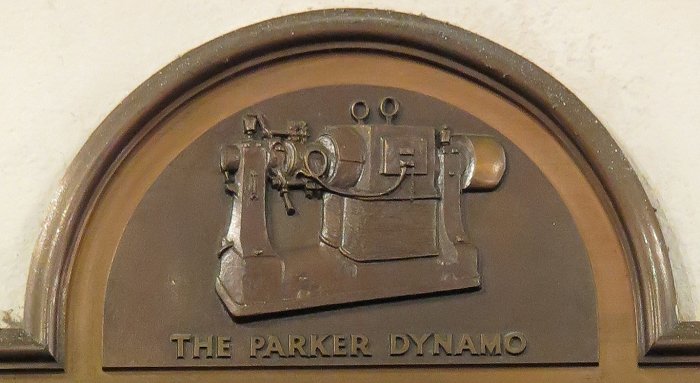
The representation of an early Parker
dynamo that's at the top of Jessie's memorial. |
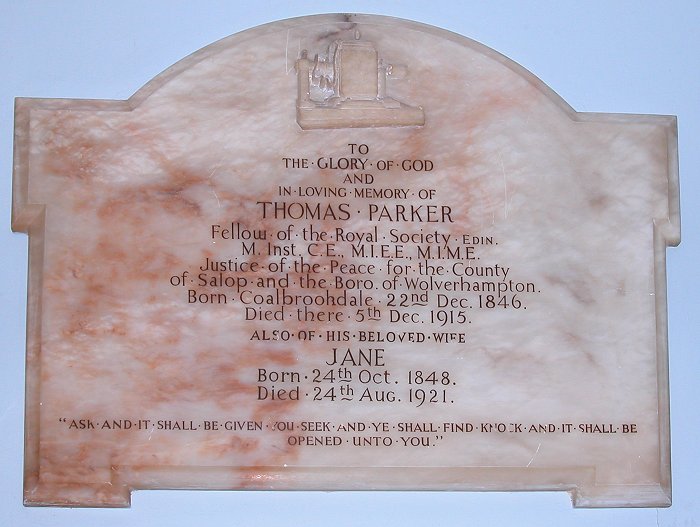
The memorial that can be found in
Madeley Parish Church.
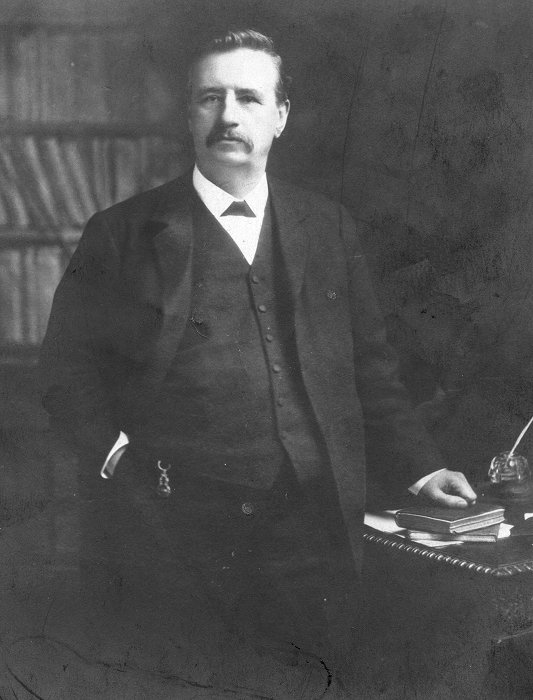
Thomas Parker. Courtesy of Gail Tudor.
There was a time, not that long ago, when Ironbridge
children used to sing a song about Thomas Parker, at school.
Unfortunately this doesn't appear to have been written down. It’s sad that such an important, local, inventive
genius, has been forgotten, and that so little has been written
about him.
This has been but a brief outline of his life and work. It is, I
hope, sufficient to show him as the great man that he undoubtedly
was. He had many great achievements and an immense intellectual
energy. At the same time he was a deeply religious and modest man
who did not seek the public eye and has consequently been overlooked
by researchers and historians.
I would like to thank Margaret and the late Maurice Darlington for
their help in producing this section. They founded the Ironbridge George Community
Archive.
 |
|
 |
|
 |
Return
to
Weights, Measures |
|
Return to
the beginning |
|
Proceed
to
the funeral |
|
|